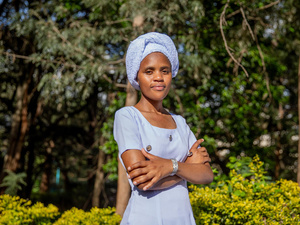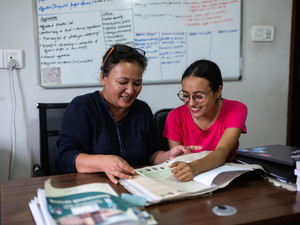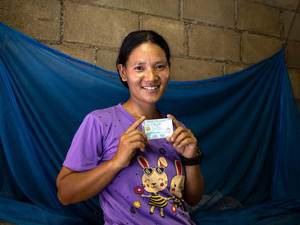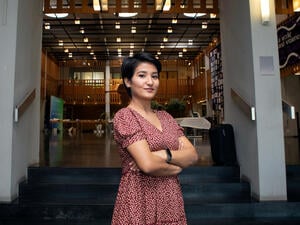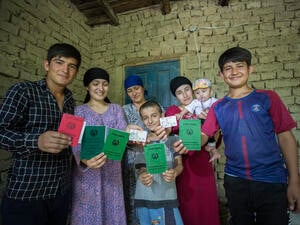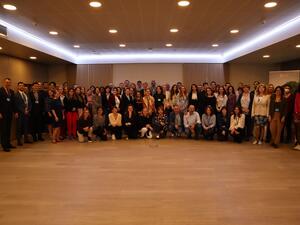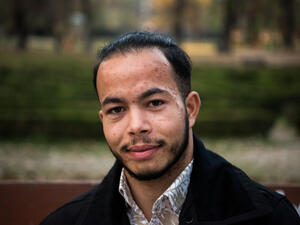Stateless former Cambodians caught in Kafkaesque web in Viet Nam
Stateless former Cambodians caught in Kafkaesque web in Viet Nam
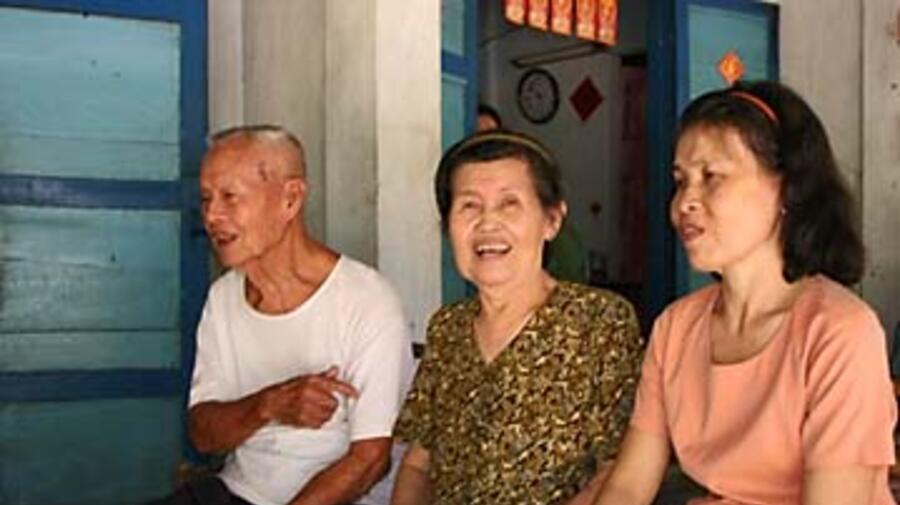
Stateless former refugee Su Mai, who says he is 100 years old, with his 80-year-old daughter (center) and 60-year-old grand-daughter (right), wants to acquire Vietnamese citizenship so he can get a passport and travel legally.
CU CHI, Viet Nam, October 30 (UNHCR) - Forced to flee Pol Pot's Cambodia in 1975 when he was just 16, Sopha Lay Demontero spent just one-third of his life in his homeland.
For all of his adult life, although he has enjoyed safety and a good livelihood in neighbouring Viet Nam, he has been caught in a Kafkaesque legal limbo, stateless and unable to do almost anything citizens of states around the world take for granted.
Now 47, he couldn't register his marriage or the birth of his two children. As children, they had no access to free health care. They couldn't study at public schools and now they can't legally work because they don't have the all-important state-issued identity card.
"We have many difficulties," says Demontero. "I can't even buy a motorbike, which is a very small thing. It's normal for transportation but I can't buy one. I had to buy it in the name of my wife," who is a Vietnamese citizen.
Demontero is one of hundreds of thousands of Cambodians who sought refuge in Viet Nam in the 1970s when the brutal Khmer Rouge under dictator Pol Pot occupied the Cambodian capital, Phnom Penh, and turned the clock back to "Year Zero."
By the early 1990s, most had been resettled to third countries, or had gone home. But some 9,500 people - including many Cambodians of Chinese ancestry - were disowned by Cambodia and were unable to return. In the chaos of being chased to the fields by the Khmer Rouge, these refugees, who today live in the countryside around Ho Chi Minh City, lost their papers and were unable to prove they were Cambodian citizens.
After more than two decades during which they learned fluent Vietnamese, intermarried and raised seamlessly-integrated families in Viet Nam, most fervently want to become Vietnamese citizens. UNHCR, the UN refugee agency, is working together with the Vietnamese government to try to end their plight.
"It's innumerable difficulties we are facing since we came to Viet Nam," says Demontero, whose unusual last name testifies to ancestors who were Portuguese missionaries to Cambodia in the 18th century.
In an effort to regularize his status, Demontero says the Immigration Department recently issued him a temporary resident's card. But the unfamiliar document just draws laughs when he tries to use it in place of an ID card.
"Everybody looks at it and says it's not valid," says Demontero, who supports his family by raising cows. Even his efforts to improve his livelihood have been stymied by his non-status.
He'd like more than the 10 cows he now has. "But if I want to expand my activities," he says, "I have to borrow money from the bank, and I can't. Other people can, but I cannot."
Many of these stateless people live in extreme poverty, and a UNHCR report this year concluded that "until this group is able to access Vietnamese citizenship, the legal structure through which they might be able to improve their lives will remain inaccessible."
Demontero, a Christian lay leader of his community, has a warm smile, but frustration and weariness creep into his voice as admits to emotional distress as well as practical difficulties.
"It's a very sad feeling," he says simply. "For example, when I see my children compared to children of my Vietnamese neighbours, who have easier access to university, easier access to work. Why do my children have different treatment?"
It is a question that also frustrates Hasim Utkan, UNHCR's Regional Representative in Bangkok. "When I joined UNHCR 28 years ago, the first thing I did was deal with this group," he says. "Next year I am retiring and their problems have still not been solved."
A requirement of acquiring Vietnamese citizenship is renouncing Cambodian citizenship. But here the refugees are caught in a Catch-22: the Cambodian government doesn't even consider them citizens, so they can't renounce a citizenship they can't prove they have.
Even if Cambodia would have him, Demontero has no desire to live there. "I have no relatives or property in Cambodia," he explains. "Our family all speak Vietnamese, I have a Vietnamese wife, my children speak Vietnamese and cannot speak Cambodian (Khmer). How could I go back to Cambodia?"
UNHCR has proposed convening three-way discussions with the Vietnamese and Cambodian governments to find a one-off solution for this stateless group.
Today Demontero, his wife and unemployed 20-year-old daughter live in a UNHCR-built house in a settlement where a refugee camp stood until 1994. It's in Cu Chi, a place better known to tourists for the elaborate system of tunnels that the Viet Cong used to evade the U.S. Army in what the Vietnamese call the American War and the Americans call the Viet Nam War.
Down the road from Demontero live three generations of stateless people - Su Mai, who says he is 100, his 80-year-old daughter Su Li Wa, and his 60-year-old grand-daughter, Ngo Kien.
As a ginger tabby cat grooms itself at their feet, the three sit on a bamboo bench on their verandah and tell of the difficulties of their situation. Ngo Kien has worked as a casual labourer, but her mother says it has always been difficult to earn a good living without an ID book, the passkey to legal employment.
"If we had Vietnamese nationality, life would be easier," says Su Li Wa, the spokeswoman for the three generations. "I always think I am Vietnamese because I am living here in Viet Nam. Now that we have become old, we want Vietnamese citizenship."
Despite being 100, Su Mai still has a case of wanderlust; earlier this year he returned to Cambodia to attend a family wedding, sneaking across the border. The main reason he wants Vietnamese citizenship, he says, is to get a passport so he could travel abroad legally.
Like all the stateless former Cambodian refugees, he's painfully aware that he's not getting any younger. As his neighbour Demontero says: "We have been waiting (for Vietnamese citizenship) for 31 years. It's too long already."
By Kitty McKinsey in Cu Chi, Viet Nam

